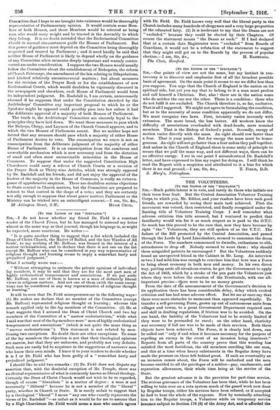[TO THE EDITOR 07 THE SPECTATOR.") Sm,—I do not know
whether my friend Dr. Field is a constant reader of the Church Times, but he has managed to misread my letter almost in the same way as that journal, though his language is, as might be expected, moro courteous. He writes :-
" It is quite another thing to suggest that a list which included the Dean of Christ Church, the Master of Balliol, and the late Warden of All Souls', to say nothing of Mr. Balfour, was framed in the interest of a narrow ecclesiasticism, and to declare that there is not one on the list except Mr. Balfour who can be considered in any way representative of religious thought and learning seems to imply a somewhat hasty and prejudiced judgment."
What I actually wrote was :- "Without attempting to estimate the private opinions of individual lay members, it may be said that they are for the most part men of highly ecclesiastical temperament and associations. If we put aside Mr. Balfour, not one of them is known as a man of definitely liberal views in religious matters. And not one of them (with the same excep- tion) can be considered in any way representative of religious thought or learning."
It will be seen that Dr. Field misrepresents me in the following ways : (I) lie makes me declare that no member of the Committee (except Mr. Balfour) represented religious thought or learning ; whereas this remark applied only to the lay members of the Committee. (2) He at least suggests that I accused the Dean of Christ Church and two lay members of the Committee of a " narrow ecclesiasticism," while what I said was that most of the lay members were " men of highly ecclesiastical temperament and associations " (which is not quite the same thing as " narrow ecclesiasticism "). This statement is not refuted by men- tioning two exceptions. No doubt there are other exceptions. To some of the lay members the objection is not that their theological opinions are narrow, but that they are unknown, and probably not very definite. Such men are easily led to acquiesce in the suggestions of narrower men who know their own minds. I leave it to your readers to decide whether it is I or Dr. Field who has been guilty of a " somewhat hasty and prejudiced judgment."
I should like to add two remarks : (I) Dr. Field does not dispute my assertion that, with the doubtful exception of Mr. Temple, there was no clerical representative of what is commonly known as liberal theology. Certainly the Dean of Christ Church would not wish to be so regarded, though of course " liberalism " is a matter of degree : a man is not necessarily " illiberal " because he is not a member of the " liberal " party, whether in Church or State. It is surely unfair to suggest that by a theological " liberal " I mean " any one who exactly represents the views of Dr. Rashdall "—as unfair as it. would be for me to assume that by a High Churchman Dr. Field would mean a man who =ells: agrees
with Dr. Field. Dr. Field knows very well that the liberal party in the Church includes many hundreds of clergymen and a very large proportion of the educated laity. (2) It is irrelevant to say that the Deans are not " excluded " because they could be elected by their Chapters. Of course the statement means " the Deans as such." If I had declared that at a certain date Magistrates were " excluded " from Boards of Guardians, it would not be a refutation of the statement to suggest that they might still get on to the Boards by the process of popular






























 Previous page
Previous page